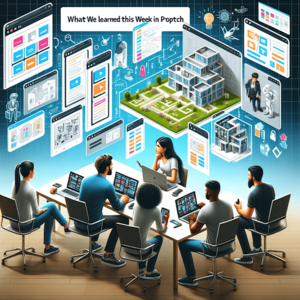Web development has witnessed a remarkable transformation, thanks in large part to the advent of no-code platforms. These platforms have eased the process of app development, making it accessible to a broader range of founders and startups, with all levels of coding expertise. In this, our first episode of the What We Learned This Week In Proptech we explore this shift, leveraging insights from a recent discussion which sheds light on the practical applications of no-code solutions in various business scenarios.
The Inevitable Pivot to No-Code
Initially, many tech professionals, including myself, viewed no-code platforms with a certain level of skepticism. It's not uncommon for seasoned engineers to dismiss these solutions as inferior or limited. However, this perception is rapidly changing as the benefits and potentials of no-code solutions become more apparent.
No-code platforms offer a way to build applications without writing a single line of code. This is particularly valuable for small teams or solo entrepreneurs who need to deploy functional apps quickly without the resources to hire a full-time developer. For instance, when faced with the daunting task of creating a web application for loan origination, underwriting, and servicing, especially under the pressure of limited resources and a tight deadline, no-code solutions like Bubble become not just an option but a necessity.
The Mechanics of No-Code Platforms
The principle behind no-code platforms is fairly straightforward: they provide an interface with drag-and-drop components that can be connected to various data stores. This approach simplifies the development process to the point where hosting is also taken care of by the platform itself.
Such a setup was instrumental when my co-host, Fernando, needed to pivot his business model due to significant changes in the commercial lending environment. With most resources laid off and a pressing need to adapt quickly, no-code platforms enabled rapid development and deployment.
Choosing the Right No-Code Platform
When I dove into Reddit forums and other communities to gauge the most popular no-code platforms, Bubble repeatedly came up as a frontrunner due to its strong footprint and search engine optimization (SEO) presence. Its capabilities extend to creating a blend of a marketplace and a project management tool, exemplified by a modified Upwork and Asana template.
However, each no-code platform has its limitations and unique features. For example, Bubble uses its proprietary framework, which means you cannot export your code out of the platform. In contrast, platforms like Flutterflow offer the flexibility to export the code written in the Flutter language framework and continue development outside the confines of the original no-code environment.
No-Code Cost Efficiency and Limitations
The cost of employing no-code solutions is significantly less than hiring a developer, though it comes with a trade-off in customization. The analogy that resonates here is the difference between buying a prefabricated home and building a custom one from scratch. For startups and small businesses, especially in the property technology sector, the ability to quickly test and iterate on an idea without a large upfront investment is invaluable.
The Reality of Tech Debt and No-Code
A critical aspect of using no-code platforms is the understanding of technical debt. While no-code solutions allow for rapid deployment, they are not immune to the buildup of tech debt. Eventually, there's a need to review and refactor the functionalities built within the no-code environment to ensure scalability and efficiency.
Moreover, even with no-code solutions, a certain level of technical acumen is necessary. While platforms like Bubble and Flutterflow are user-friendly, they are still complex web applications that require some understanding of technology and design principles to use effectively.
The Verdict on No-Code Solutions
No-code platforms are changing the landscape of app development and business operations. They empower non-technical founders and teams to bring their ideas to life, providing an avenue for innovation and entrepreneurship that was previously gated by technical barriers. The key to leveraging no-code solutions lies in understanding their strengths and limitations and using them as a stepping stone towards more sophisticated and customized solutions as the business grows and evolves.
As we continue to witness the rise of these platforms, it's clear that they are not just a temporary workaround but a fundamental shift in how we approach problem-solving and development in the digital age. No-code is not just about building applications; it's about building opportunities and possibilities for a future where technology is inclusive and accessible to all.
Tune in to our next episode when we'll discuss fundraising in proptech.


